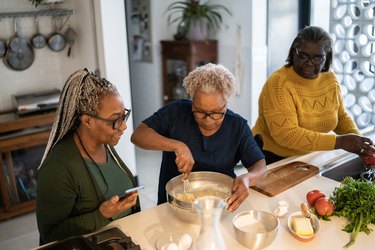
The concept of self-care has radical roots, but its history is often lost in today's messaging that equates consumerism to caring for yourself. What's also missing from mainstream conversation is how community care — not just self-care — is key to collective wellbeing. But what is community care, exactly?
"If self-care is about what you do for yourself, then community care is what you put into and what you are able to receive from the community you have built around yourself, as well as the community you live in," says Donna Oriowo, PhD, LICSW, therapist, author and licensed independent clinical social worker.
Video of the Day
Video of the Day
Here's how community care and self-care are connected, what community care looks like in practice and how it supports all of our wellbeing.
Tip
Practicing community care can look like cleaning for a friend who is going through a tough time, donating to mutual aid efforts or getting to know (and helping out) your neighbors.
What Is Community Care?
Unlike the messages we often receive about self-care, which focus on individual efforts to achieve wellness, community care consists of the collective efforts we make to be healthy and happy.
"Community care differs from self-care because self-care is about the individual; community care is about the community," says Ajita Robinson, PhD, grief and trauma therapist and author of The Gift of Grief. "The community benefits when each individual is well, whole and thriving."
This can happen on a micro and macro level. For Robinson, community care looks like creating spaces where her clients (who are people who identify as Black women doctors) can connect with each other and exchange support.
Sharing resources is also community care. "I define community care as how we show up and create space for each other,"says Rayna Smaller, LSW, licensed social worker, therapist and founder of BrownGirl Space. "It's how we share and create resources among one another and create dependable relationships."
Community Care and Marginalized Communities
While everyone can benefit from community care, it is an especially beneficial (and historical) practice for marginalized communities that face systemic barriers that jeopardize their wellness, such as poverty or the high cost of health care.
"For communities of color, {community care} is especially necessary as we continue to navigate white supremacy in our daily lives," Oriowo says. "We need a space where we can tap in and receive healing, restorative care and love on each other."
Community care allows people to pool together assets, support, resources and time, Robinson says. "Historically, one example of this looked like neighbors collectively looking out for the children in their community," she says. "In my own lived experience in the midst of a violent urban city, my grandmother's home was a safe zone for all."
The History of Self-Care and Community Care
Now you know what community care is. But how did it come about?
"Self-care and community-care are very much linked," Oriowo says. "There is only so far self-care can go without a community around you to help support you in the moments when you may not be at your best. True self-care does not look like the hyper-individualism we have been taught."
In other words, there's no community care versus self-care: Rather, the two complement each other, and both are necessary for individual and collective wellbeing.
The emergence of self-care as a concept can be traced back to health care settings in the 1950s, per Unite for Reproductive & Gender Equity (URGE). The term was originally used to describe actions that people living in care institutions could perform in order to have a sense of autonomy, like exercising and grooming themselves.
That definition has since shifted, and today, self-care is defined as the activities and practices that we engage in regularly to maintain our mental and physical health and wellbeing, per the University at Buffalo School of Social Work. Common examples include exercising, starting therapy, setting boundaries or resting.
We can thank communities of color for helping establish the connection between between self-care and overall wellness. In the 1970s, the Black Panther Party espoused the importance of Black people prioritizing their wellbeing to develop resilience while living under oppressive systems, per URGE.
Black, queer writer and activist Audre Lorde further pushed the definition of self-care in her 1988 book A Burst of Light, where she wrote, "Caring for myself is not self-indulgence, it is self-preservation, and that is an act of political warfare." This has served as a declaration of self-care — particularly for Black people assigned female at birth, who are often caregivers.
These messages about the importance of self-care evolved to include community care as people shared resources for food, health care and education with other Black folks.
So although it may seem like self-care and community care are two independent practices, both can ultimately support the health and wellbeing of ourselves and those around us.
What Does Community Care Look Like?
Interdependence is the root of community care, Robinson says. "It is designed to create stability, flexibility and safety. We each have the capacity to create community care circles in our own spheres of influence," she says.
On a micro-level, practicing community care can look like:
- Cooking or cleaning for a loved one who is going through a tough time
- Carpooling
- Asking for help from your support system when you need it (and reciprocating it)
- Getting to know your neighbors
According to Robinson and the Massachusetts Department of Public Health, macro-level community care can look like:
- Community clothing swaps
- Mutual aid
- Community fridges
- Digital spaces that offer bonding and connection over a particular topic or for a specific group of people
- Donating or organizing donations for community members who have experienced a crisis
- Connecting people who are unemployed to work opportunities (if you can)
- Volunteering
- Hosting a regular community gathering
The Health Benefits of Community Care
"Moving closer to wellness is a collective, collaborative effort," Oriowo says. "One of us cannot be well and everyone else is not. In working together to help ensure others' needs are met, we are most likely to feel well individually and as a community."
In other words, a chain is only as strong as its weakest link.
Shifting your focus from self-care to community care can help you and others feel connection. For example, tapping into your network can help stave off feelings of loneliness, Oriowo says.
Per Mental Health America, other benefits of social connection include:
- Increased happiness
- Better health
- Longevity
A October 2015 study in the American Journal of Lifestyle Medicine found that social support and connectedness are linked to the following health effects:
- Decreased depressive symptoms
- Maintaining a beneficial body mass index
- Controlling blood sugar levels
- Mitigating post-traumatic stress disorder symptoms
And apart from the very real health perks of being in community with and caring for others, community care also invites us to imagine less-tangible benefits, like new systems of being.
Marginalized people especially are often expected to self-care their way out of social inequities. But self-care on its own — especially more surface-level practices like an occasional day off or a nice bubble bath — doesn't break down the barriers to wellness that Black, brown, LGBTQIA+, disabled, poor and other marginalized people face.
Instead, a commitment to and practice of community care can help to foster health and healing in the most vulnerable populations.
"Community care helps address the needs and gaps: It empowers us to take care of each other," Smaller says. "We don't always have to wait for organizations or the government to see us and help us. We have the power to help ourselves."
- Unite for Reproductive & Gender Equity: "THERE IS NO SELF-CARE WITHOUT COMMUNITY CARE"
- University at Buffalo School of Social Work: "Introduction to Self-Care"
- Massachusetts Department of Public Health: "The Self-Care – Community Care Connection"
- Mental Health America: "How Connections Help"
- American Journal of Lifestyle Medicine: "The Connection Prescription: Using the Power of Social Interactions and the Deep Desire for Connectedness to Empower Health and Wellness"
Is this an emergency? If you are experiencing serious medical symptoms, please see the National Library of Medicine’s list of signs you need emergency medical attention or call 911.



